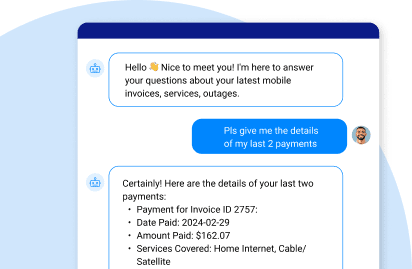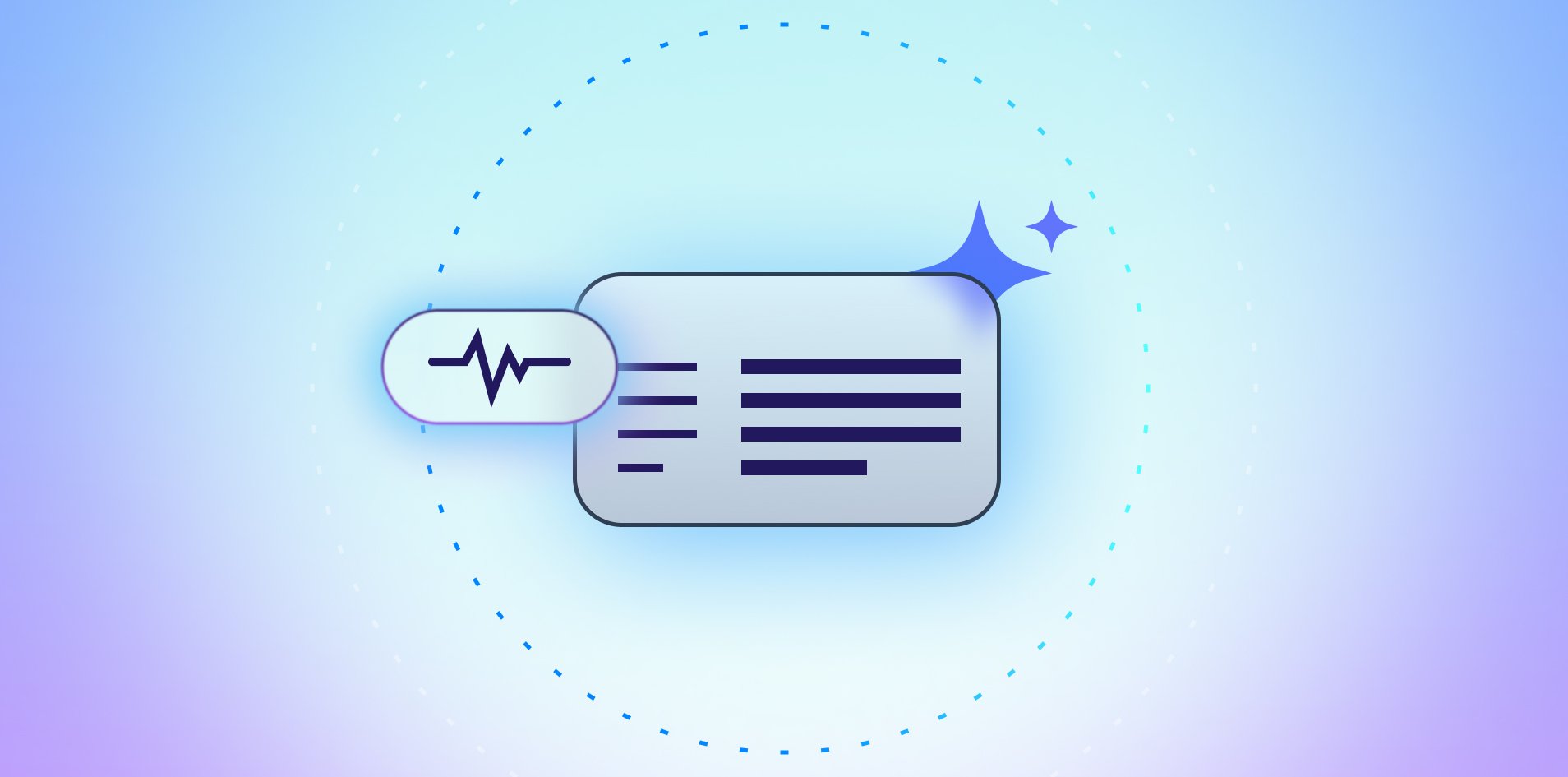Table of contents
Conversational AI in healthcare is a technology that uses AI to allow patients, providers, and staff to communicate through chatbots or virtual assistants.
Importance of conversational AI in healthcare
The healthcare landscape is undergoing a seismic shift, and at the forefront of this transformation is a technology called conversational artificial intelligence (“conversational AI”). Frenzied demand for better efficiency, accuracy, and patient care is driving the market. From booking appointments to providing mental health crisis support, AI-powered chatbots and virtual assistants are proving to be incredibly useful tools for healthcare professionals.

The market for conversational AI in healthcare is explosive, with hundreds of thousands of digital health apps used by patients worldwide. In 2022, Frost & Sullivan predicted revenues for the global AI in healthcare market of over $6 billion in 2025, but in actuality were almost $27 billion in 2024 – with the market expected to grow at a CAGR of nearly 40% from 2025 until 2030. A 2024 Microsoft-IDC study revealed that almost 80% of healthcare organizations were using AI technology, reporting ROI in just over a year, generating over $3 for every $1 invested.1
Conversational AI in healthcare applications
With the ability to provide a 24/7 hotline, conversational AI in healthcare is a game-changer – especially when powered by the latest generative AI (GenAI) frameworks, like Retrieval-Augmented Generation (RAG) and Table-Augmented Generation (TAG), that inject real-time enterprise data into Large Language Model (LLM) prompts for more accurate and secure responses.
Patients can now access information, make or change appointments, and order prescriptions, whenever they like, significantly enhancing convenience and satisfaction. Key applications include:
-
Symptom triage
A customer service chatbot can guide patients through a series of questions to assess their symptoms and recommend appropriate next steps, such as self-care, a call, or an in-person visit. This initial triage helps to alleviate the burden on emergency services and directs patients to the right level of care more efficiently.
-
Medication management
Conversational AI can send personalized reminders for medication intake, track adherence, and even provide information about potential drug interactions. This is particularly crucial for patients managing chronic conditions.
-
Mental health support
AI chatbots are emerging as first responders for emotional support, offering coping mechanisms for stress and anxiety, and delivering elements of cognitive behavioral therapy. While not a replacement for human therapists, they offer an accessible and often anonymous first point of contact for individuals seeking help.
-
Administrative efficiency
With a conversational AI platform, healthcare providers can automate a host of administrative tasks, including appointment scheduling, patient registration, insurance verification, and answering frequently asked questions – freeing up medical staff to focus on more complex issues.
-
Enhanced patient engagement
AI can proactively engage patients with personalized health information, deliver post-treatment follow-up instructions, and answer questions about their conditions or treatment plans – empowering patients to take a more active role in their health.
-
Support for the elderly
Voice-based AI assistants can combat loneliness, provide reminders for medication and appointments, and facilitate easier communication with caregivers and healthcare providers, enhancing the quality of life for older adults.
-
Streamlining clinical workflows
Beyond patient-facing applications, conversational AI can assist clinicians by quickly retrieving patient information from Electronic Health Records (EHRs), transcribing notes, and supporting clinical decision-making processes.
Benefits of conversational AI in healthcare
The integration of conversational AI into healthcare brings many advantages, including:
-
Improved accessibility
Patients gain round-the-clock access to information and basic support, irrespective of their location or the time of day.
-
Enhanced efficiency
Automation of routine tasks streamlines workflows, reduces administrative burdens, and can lead to significant cost savings for healthcare organizations by optimizing resource allocation and minimizing missed appointments.
-
Increased patient engagement
Personalized interactions and readily available information encourage patients to be more involved in managing their health and well-being.
-
Better patient care
Improved medication adherence, timely access to care, and continuous support can contribute to better care, especially for individuals with chronic diseases.
-
Reduced workload for healthcare professionals
By handling initial inquiries and routine tasks, conversational AI allows doctors, nurses, and administrative staff to dedicate their expertise to more critical and complex patient needs.
-
Data-driven insights
The interactions with conversational AI systems can generate valuable data (when managed ethically and securely) that can be analyzed to identify trends, improve services, and advance medical research.

Challenges of conversational AI in healthcare
Despite its transformative potential, the widespread adoption of conversational AI in healthcare is not without its challenges, including:
-
Accuracy and reliability
The most significant concern is the accuracy of medical information and of advice provided by AI. Misdiagnosis or incorrect treatment suggestions can have severe consequences. Ensuring the reliability of these systems, which often depend on the quality of the data, is paramount.
-
Data privacy and security
Healthcare data is incredibly sensitive. Conversational AI systems must comply with stringent data privacy regulations like HIPAA (Health Insurance Portability and Accountability Act) in the US and GDPR (General Data Protection Regulation) in Europe. Robust security measures are essential to protect against data breaches and unauthorized access.
-
No bedside manner
While GenAI apps can simulate conversation, they can’t replicate the empathy, compassion, and nuanced understanding that real doctors and nurses provide. The machine dilemma is particularly critical in sensitive situations and for patients requiring emotional support.
-
Moral accountability
Who’s responsible if a GenAI system makes an error leading to patient harm? Establishing clear lines of accountability and developing ethical guidelines for the development and deployment of these technologies is crucial. Decisions regarding medical treatment often involve complex ethical considerations that AI isn’t equipped to handle.
-
Digital literacy
Not all patients have equal access to, or comfort with, technology. So, a key challenge is ensuring that conversational AI solutions don’t make existing health disparities worse, by excluding those who aren’t computer savvy.
-
Integration with existing systems
Seamless integration of conversational AI with existing healthcare infrastructure, such as EHRs, can be technically complex and costly.
-
Regulatory oversight
The regulatory landscape for conversational AI in healthcare is still evolving. Clear guidelines and standards are needed to ensure patient safety, efficacy, and ethical use of these technologies.
The future of conversational AI in healthcare
The evolution of conversational AI in healthcare is far from over. We can anticipate several exciting trends:
-
Increased sophistication of Natural Language Processing (NLP)
AI will become even better at understanding context, sentiment, and nuanced human language, leading to more natural and effective interactions.
-
Hyper-personalization
Conversational AI will leverage individual patient data (with consent and powered by real-time data access technologies) to provide AI personalization in the form of highly tailored advice, reminders, and support.
-
Proactive health management
Agentic AI systems will move beyond reactive responses to proactively engage with patients, identifying potential health risks and encouraging preventative measures.
-
Integration with wearables and IoT devices
Seamless data sharing between conversational AI and personal health devices will enable more comprehensive health monitoring and personalized interventions.
-
Advanced diagnostics and clinical decision support
While not replacing clinicians, AI will offer increasingly sophisticated support in analyzing medical images, interpreting lab results, and suggesting potential diagnoses or treatment pathways.
-
Improved mental health interventions
More advanced AI-driven therapeutic tools will become available, offering scalable and accessible support for a wider range of mental health needs.
Better conversational AI in healthcare with K2view
A significant factor in the effectiveness of conversational AI, particularly in complex sectors like healthcare, is its ability to access and use the most current information. This is where K2view comes in.
K2view enhances conversational AI tools by enabling real-time access to fresh enterprise data. Its patented Micro-Database™ technology allows GenAI platforms to retrieve AI-ready data from existing CRM or ERP systems with very low latency).
In a healthcare context, this capability is vital. Imagine a patient interacting with an AI assistant to inquire about recent lab results or upcoming appointments. For the system to provide accurate and relevant information, it needs immediate access to the latest data from the hospital's systems.
K2view GenAI Data Fusion quickly feeds the necessary information into the LLM, ensuring that the responses are up-to-date, significantly improving the accuracy of the response and enhancing the overall user experience. By addressing the critical challenge of real-time data access, K2view unlocks the full potential of conversational AI in healthcare for more reliable interactions.
Discover how K2view GenAI Data Fusion
optimizes conversational AI in healthcare.












